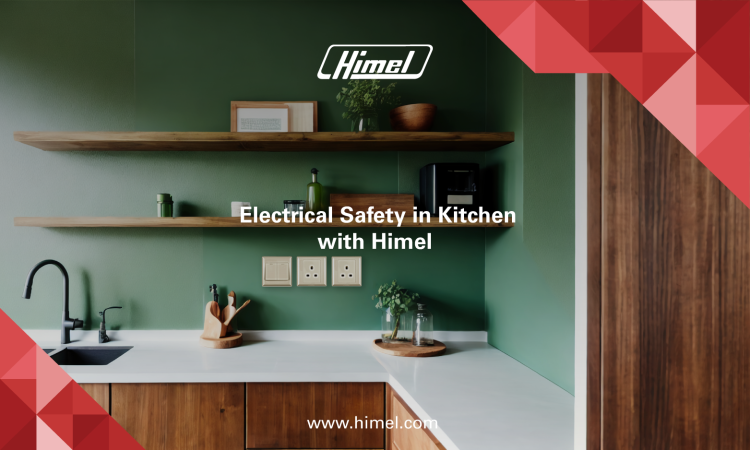Ensuring Electrical Safety in the Kitchen

It’s safe to say that everyone loves to eat. Whether you enjoy cooking or just want to reheat to-go foods, the kitchen is one of the most used places in a home. As you may already know, being in the kitchen can be satisfying and dangerous at the same time. In order to make the scrumptious meal that fuels our day, we have to plug electrical products – and sadly, many take this step for granted.
Domestic appliances are always the main outlets of electricity in your home. These appliances can cause injuries if they are not handled properly or if there is a faulty electrical wiring, turning a kitchen into a potential safety hazard. Thankfully, there are many things you can do to avoid these dangers and keep yourself safe when using your kitchen.
Here are some kitchen electrical safety tips that we’ve narrowed down for you.
Use Extension Cords Sparingly
While extension cords are convenient for connecting electrical appliances, safety should be prioritized. It's essential to use them sparingly in the kitchen to avoid hazards related to electrical wiring. Prolonged use of extension cords can lead to overheating and increase the risk of electrical fires.
Remember to plug appliances directly into wall sockets whenever possible, reserving extension cords for temporary purposes. Opt for high-quality extension cords capable of handling the electrical load of your kitchen gadgets.
Unplug Your Appliances After Use
Develop a habit of unplugging electrical equipment when not in use. Even when turned off, appliances left plugged in can pose a risk, particularly during power surges or due to faulty wiring. This simple practice not only conserves energy but also eliminates potential electrical hazards.
Practicing this small step ensures safety and reduces the risk of accidents.
Inspect and Replace Damaged Power Cords
Regularly inspect all house electrical wirings, particularly your power cords for signs of damage, such as fraying, cuts, or exposed wires. If you come across any damaged cords, immediately replace them with new ones or seek professional repair. Using faulty power cords increases the risk of electrical shock and potential fires.
Invest in Quality Switches and Socket
Upgrading to high-quality switches and sockets is a wise investment for kitchen electrical safety. Low-quality or worn-out switches can cause sparks, potentially leading to electrical fires. Choose reliable switches and sockets designed to withstand the demands of a kitchen environment, ensuring smooth operation and reducing risks.
Ensuring that your house wiring is up to standard and using quality cables and wires can prevent dangerous situations.
Periodically Check Your MCBs
Regularly inspect and test your Miniature Circuit Breakers (MCBs) to protect your kitchen from electrical overloads. Well-maintained MCBs are crucial for preventing potential hazards. If you encounter any issues, promptly contact a qualified electrician to address the problem. By ensuring the proper functioning of your MCB electrical panel, you safeguard your kitchen from electrical issues.
Watch Out for Liquids
The presence of liquids near electrical appliances is extremely hazardous and can lead to accidents. Keep water and other liquids away from power outlets, switches, and electrical equipment. In case of accidental spills, dry the area immediately and ensure it's safe before using any electrical appliance.
Following this kitchen safety rule can prevent electrical issues in the kitchen.
Install Proper Lighting
A well-lit kitchen is not only efficient for cooking but also contributes to safety. Ensure your kitchen has adequate lighting, especially near electrical outlets and switches. To do this, make sure you invest in reliable electrical products. Ample illumination reduces the risk of accidental spills and helps you identify potential hazards more easily.
Avoid Overloading Outlets
Resist the temptation to overload outlets with multiple high-power appliances, using multi-plug adapters excessively, or connecting wires in an unsafe manner.
Overloading outlets and improperly connecting wires can lead to overheating and potential electrical fires. It's crucial to distribute the load across different outlets and circuits and ensure proper wire connections to maintain a safe electrical setup.
Educate Yourself on DIY Electrical Repairs
While it's essential to know basic electrical safety tips, complex electrical repairs are best left to professionals.
Attempting DIY electrical repairs without proper knowledge and experience can be extremely dangerous. Educate yourself on what you can handle safely and when to call a licensed electrician to avoid accidents and ensure the safety of your kitchen's electrical system.
A little caution goes a long way when it comes to safety in the kitchen. You should not just look at your knives and pans – you should also look around and check your electrical equipment and electrical wirings. The kitchen may be the heart of the home, but let's not forget it can also be a hotbed of electrical hazards.
Himel cares about everything that matters to you. So, let's use your kitchen responsibly, follow these tips we've shared, and remember: the secret ingredient to a safe and happy home is to have the right electrical products beside you.
